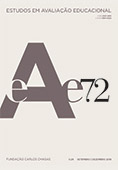Washback effect of an application of a proficiency examination for teachers
DOI:
https://doi.org/10.18222/eae.v29i72.4547Keywords:
Teacher Training, English Language, Linguistic, Communicative and Pedagogical Proficiency, Proficiency Exam.Abstract
This paper deals with some issues related to the analysis of two narratives written by in-service and pre-service English language teachers, following an application of a Proficiency Examination for Foreign Language Teachers [Exame de Proficiência para Professores de Língua Estrangeira – EPPLE] in a public university located in the western Amazon. The discussion is based on the following principles: (i) the implications for assessment in the teaching and learning of foreign languages related to the reconstruction and promotion of socialized practices; (ii) the quality of a linguistic, communicative and pedagogical proficiency of foreign language teachers underlying the elements of validity and reliability of EPPLE; and (iii) the intersection of experiences materialized as washback effects from a process of assessment practices. The analysis of the teachers’ discourses indicates an intersection between teachers’ memories and professional experiences.
Downloads
References
ABRAHÃO, Maria Helena V. A formação do professor de línguas de uma perspectiva sociocultural. Signum: Estudos de Linguagem, v. 15, n. 2, p. 457-480, 2012.
ABRAHÃO, Maria Helena V. Sessões colaborativas na formação inicial e em serviço de professores de inglês. Revista Horizontes de Linguística Aplicada, v. 13, n. 1, p. 15-39, 2014.
BAILEY, Kathleen. Working for washback: a review of the washback concept in language testing. Language Testing, v. 13, n. 3, p. 257-279, 1996.
BOUD, David. Sustainable assessment: rethinking assessment for the learning society. Studies in Continuing Education, v. 22, n. 2, p. 151-167, 2000.
BURROWS, Catherine. Washback in classroom-based assessment: a study of the washback effect in Australian adult migrant English program. In: CHENG, L.; WATANABE, Y.; CURTIS, A. (Ed.). Washback in language testing: research, contexts and methods. New Jersey: Lawrence Erlbaum Associates, 2004. p. 113-128.
CONSOLO, Douglas A.; TEIXEIRA DA SILVA, Vera Lúcia. Em defesa de uma formação linguística de qualidade para professores de línguas estrangeiras: o exame EPPLE. Revista Horizontes de Linguística Aplicada, v. 13, p. 63-87, 2014.
CONSOLO, Douglas A.; TEIXEIRA DA SILVA, Vera Lúcia. Foreign language teachers’ proficiency: the implementation of the EPPLE examination in Brazil. In: GITSAKI, Christina; COOMBE, Christine (Org.). Current issues in language evaluation, assessment and testing. Newcastle upon Tyne: Cambridge Scholars Publishing, 2016. p. 201-219.
HOFFMAN, Jussara M. L. Avaliação mediadora: uma relação dialógica na construção do conhecimento. Idéias, São Paulo, n. 22, p. 51-59, 1994.
JOHNSON, Karen E.; GOLOMBEK, Paula R. (Org.). Research on second language teacher education: a sociocultural perspective on professional development. New York: Routledge, 2011.
JOHNSON, Karen E.; GOLOMBEK, Paula R. (Org.). Mindful L2 teacher education: a sociocultural perspective on cultivating teacher’s professional development. New York: Routledge, 2016.
LANTOLF, James P.; POEHNER, Matthew E. Dynamic assessment in the language classroom. Language Teaching Research, v. 9, n. 3, p. 233-265, July 2005.
LANTOLF, James P.; POEHNER, Matthew E. (Org.). Sociocultural theory and the pedagogical imperative in L2 education. New York: Routledge, 2014.
LORTIE, Dan. Schoolteacher: a sociological study. London: University of Chicago Press, 1975.
LUCKESI, Cipriano C. Avaliação da aprendizagem escolar. 3. ed. São Paulo: Cortez, 1996.
McNAMARA, Tim. Language assessment as social practice: challenges for research. Language Testing, v. 18, n. 4, p. 333-349, 2001.
PERRENOUD, Philippe. A avaliação entre duas lógicas. In: PERRENOUD, P. Avaliação: da excelência à regulação das aprendizagens – entre duas lógicas. Tradução de Patrícia Chittoni Ramos. Porto Alegre: Artes Médicas Sul, 1999.
QUEVEDO-CAMARGO, Gladys. Efeito retroativo da avaliação na aprendizagem de línguas estrangeiras: que fenômeno é esse?. In: MULIK, Katia Bruginski; RETORTA, Miriam Sester (Org.). Avaliação no ensino-aprendizagem de línguas estrangeiras: diálogos, pesquisas e reflexões. Campinas: Pontes, 2014. p. 1-16.
QUEVEDO-CAMARGO, Gladys; SCARAMUCCI, Matilde. R. V. Methodology in washback studies. In: GITSAKI, Christina; COOMBE, Christine (Org.). Current trends in language evaluation, assessment & testing: research perspectives. Newcastle upon Tyne: Cambridge Scholars Publishing, 2016. p. 287-304. SCARAMUCCI, Matilde R. V. Avaliação: mecanisno propulsor de mudanças no ensino/aprendizagem de LE. Revista Contexturas, São José do Rio Preto, v. 4, p. 115-124, 1999.
SCARAMUCCI, Matilde R. V. Efeito retroativo da avaliação no ensino/aprendizagem de línguas: o estado da arte. Trabalhos em Linguística Aplicada, Campinas, v. 43, n. 2, p. 203-226, jul./dez. 2004.
TEIXEIRA DA SILVA, Vera Lúcia. Communicative competence in foreign languages – What concept is this? Revista Contexturas, São José do Rio Preto, n. 23, p. 149-160, 2014.
VYGOTSKY, Lev A. Mind in society: the development of higher psychological processes. Cambridge, MA: Harvard University Press, 1978.
VYGOTSKY, Lev A. Thought and language. Cambridge, MA: The MIT Press, 1986.
WATANABE, Yoshinori. Methodoly in washback studies. In: CHENG, Liying; WATANABE, Yoshinori; CURTIS, Andy (Ed.). Washback in language testing: research contexts and methods. New Jersey: Lawrence Erlbaum Associates, 2004. p. 19-36.
Downloads
Published
How to Cite
Issue
Section
License
Copyright (c) 2018 Estudos em Avaliação Educacional

This work is licensed under a Creative Commons Attribution-NonCommercial 4.0 International License.
Authors who publish in this journal agree to the following terms:
a. Authors retain the copyright and grant the journal the right to first publication, with the paper simultaneously licensed under the Creative Commons Attribution License (CC BY 4.0) license that allows the sharing of the paper with acknowledgment of authorship and initial publication in this journal.
b. Authors are authorized to assume additional contracts separately, for non-exclusive distribution of the version of the paper published in this journal (for example publishing in institutional repository or as a book chapter), with acknowledgment of authorship and initial publication in this journal.
c. Authors are allowed and encouraged to publish and distribute their paper on-line (for example in institutional repositories or on their personal page) at any moment before or during the editorial process, as this can generate productive changes, as well as increase the impact and citation of the published paper (See The Effect of Open Access).








